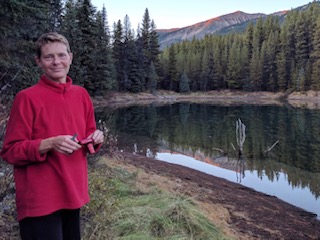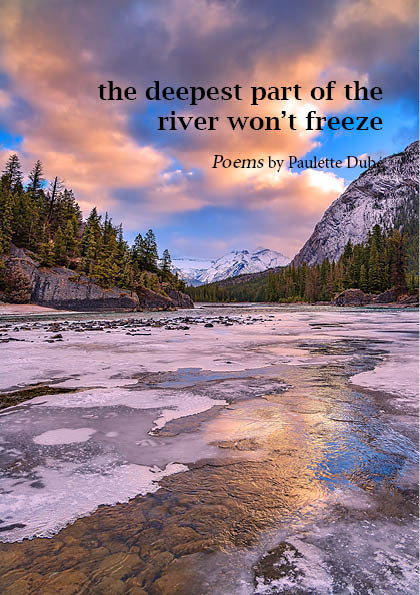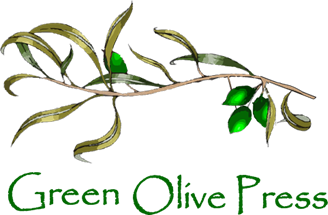Paulette Dubé
Paulette Dubé relies on the good fortune of living in Jasper National for her daily dose of magic realism. Her poetry and prose have garnered a number of awards and short list nominations including the Milton Acorn Memorial People’s Poetry Award, the CBC Alberta Anthology, the CBC Literary Awards, the Alberta Writers’ Guild Best Novel Award, the Starburst Award, the Exporting Alberta Award and the Fred Kerner Award. What an impressive list!
Paulette’s dose of magic realism makes her, and her work, sparkle and shine, and it is these sparkles that make readers stand up and notice. Her poetry glistens, even in times of hardness.
In all of her work, Paulette draws on twenty-seven years of living in the Three Rivers Confluence, where even at -40C you can hear the muscle of moving river water beneath thick ice, to explore the intrinsic connection between humans and nature.

Books
the deepest part of the river won't freeze |
|
|---|---|

|
We must witness if we are to have any sense of belonging and place. This session focuses on giving participants ‘permission’ to sit, watch and write. They will gain insight into a mountain woman’s perspective, hard-won after living and writing in the Canadian mountains for 25 years, and learn how one thinks is the way to attempt any kind of writing. The land reacts to us when we belong: if we expect nothing, we gain everything.
Paulette Dubé’s new poetry collection entitled the deepest part of the river won’t freeze, is crammed with elegant pieces that relate to family, domesticity, and the everyday life that we all experience. She farewells a son and his partner, buries the ashes of her uncle, has a serious korero with her nephew, and considers her own DNA. She views her life as ‘stitched together with falling stars’ (Walked a dusty road).
The pieces contain many beautiful images borrowed from the natural world, acting as metaphors. For instance, the title of the collection, the deepest part of the river won’t freeze, is not only good physical advice for crossing winter rivers but it can also be taken as a comment on coping with existence.
Poems such as Once in awhile present us with profound thoughts and profound emotions, provocative and meaty enough for us to continue to chew on some time after the words have been read and the pages closed:
Once in awhile
I look back.
The view has both relentless shadow and
ferocious intent. There is no half way now
we drink or we drown.
The effective long piece, These women, is a celebration of female friends, and Dubé tells us that she cannot imagine what her adult self would have been like without them:
…These women are
the stone markers I use to map myself a whole world.
She feels supported and inspired by these women and she rates the value of kith and friendship higher than kingdom-building. This poetry is about facing fear, something we are all aware of in the world’s present COVID-virus situation. In her Canadian world there are also receding glaciers, signifying the fear of climate change:
This is the last glacier leaving
blue pockets of self on mountain
tops and in the hearts of those charged
to protect such things…
form a line, another long piece, is an inspiring ‘list’ poem containing philosophy and wry humour within lines such as: Our decisions carry on without us, and Medicine is a verb, besides Usually an arsehole is not so much born, as made.
In the very first poem, We are dark gardeners, weeding by moonlight, Dubé writes:
Raven calls back across winter
simple wisdom of sinew over bone
feather claw and beak.
I see Dubé as the Raven who is calling ‘simple wisdom’ to us from across the snow and trail. The poems chronicle stones, the fire road, seeds, stars, an eagle’s talon, willow whips, bears, pine pollen, and fox and elk – all aspects of the author’s environment in Jasper, Alberta, Canada.
Because of the way she speaks about these things we are plunged immediately into her world of back-country where a trailhead symbolises the beginning (or the end), where the trail sits as a representation of life, and where the natural elements are actual signs and tokens of everyday existence. Like the iconic mythology surrounding the concept of ‘the road’, for Dubé ‘the trail’ is a metaphor of freedom. It is where she feels unfettered from clocks and baggage, and gains spiritual healing and a more acute awareness of her natural environment.
It is an alternative space, a lacuna of identity, risk-taking, and emancipation, and encourages the mobility and liberty required for the female body to leave the home and traverse the open landscape. Dubé’s trail facilitates adventure, and enables the female body to create its own cartography and spatiality.
Review by Vivienne Plumb Out of stock |
